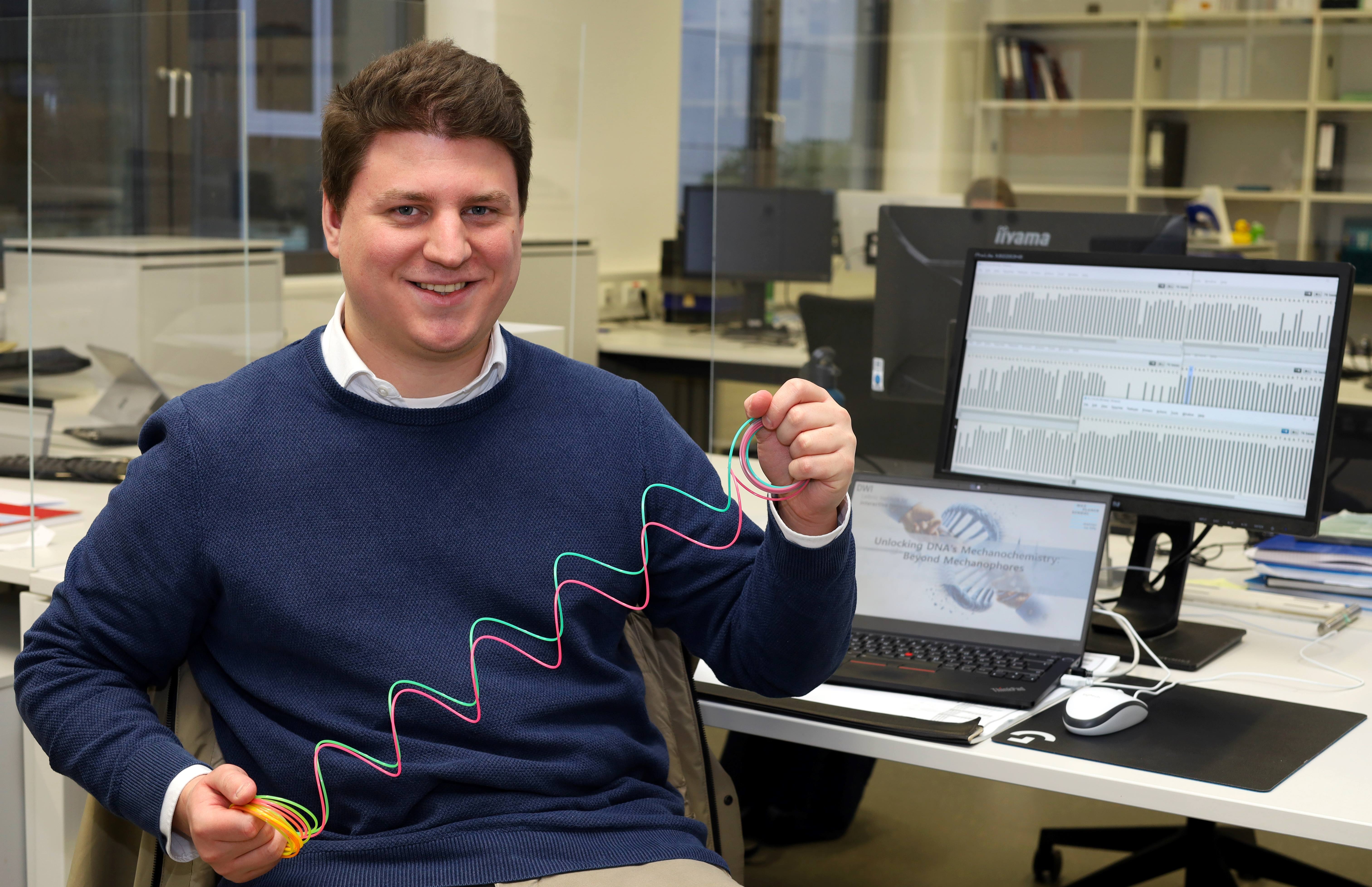Fulbright Stipendium for Johannes Hahmann

Johannes Hahmann, a doctoral student in Andreas Herrmann's research group, has been awarded a Fulbright scholarship. In spring 2025, he will spend six months in the USA conducting research with Rizal Hariadi at the Biodesign Institute at Arizona State University. The Fulbright program is one of the most prestigious scholarship programs in the world and is aimed at doctoral students, among others, to enable them to carry out research stays in the USA. The German‑ American Fulbright Commission (Fulbright Germany) thus facilitates academic exchange between the USA and Germany.
Controlling cellular processes with ultrasound
As part of his dissertation in Andreas Herrmann's research group, Johannes Hahmann is working on polymer mechanochemistry and DNA nanotechnology, which are used in the fields of sonopharmacology and sonogenetics. Johannes Hahmann makes use of ultrasound as an external trigger: In sonopharmacology, for example, the activity of different classes of active substances can be specifically controlled with ultrasound to achieve their specific spatio-temporal release and activation. In sonogenetics, on the other hand, genetic engineering and ultrasound are combined to enable non-invasive and precise manipulation of biological processes in cells. In the laboratory, Johannes Hahmann develops DNA nanostructures that are mechanically unstable at precisely defined points. Using next-generation sequencing, he can track mechanically induced polymer breaks down to the level of individual monomers. This enables him to identify the mechanisms that lead to breaks in his DNA nanostructures.
Drug delivery vehicle made of DNA
In the project he wants to pursue in the USA with the help of the scholarship, Johannes will increase the spatial and structural complexity of his work: Instead of predetermined breaking points in one-dimensional DNA systems, he wants to insert predetermined breaking points into two- and three-dimensional DNA nanostructures. "I am particularly interested in so-called DNA origami structures. DNA origami is a technique in which long DNA strands are folded in such a way that they form complex, nanoscale structures, similar to the Japanese paper folding technique of the same name, 'origami'. Shorter DNA strands function like a kind of staples that hold the long strands together in the right places. In this way, it is possible to produce tiny and precisely shaped drug containers from which small therapeutic molecules can be released for medical applications," explains Johannes Hahmann.
The Fulbright scholarship enables him to spend six months in the USA as part of his doctoral research. "I chose Rizal Hariadi's research group at Arizona State University because it brings together a lot of in-depth biophysical understanding of the forces at work at the nanoscale. At the Biodesign Institute in Arizona, I also have direct access to a strong network of collaborators and a variety of state-of-the-art equipment - all in one place."
Expanding the scientific and cultural horizon for his own future
In addition to his professional interest as one of the main motivators, Johannes also has a great personal interest: "I'm really looking forward to getting to know a new scientific culture, gaining insights into the North American system and broadening my scientific-cultural horizons. I think the Fulbright program is a great opportunity to gain initial experience in a country that will hopefully accompany me on various paths in my future career in science," says Johannes Hahmann.
Johannes Hahmann is already certain that he will continue his academic career after completing his doctorate. This certainty emerged during his participation in the Max Planck School "Matter to Life" Master's programme, a joint graduate programme of the partner universities of Heidelberg and Göttingen as well as various other research organizations such as the DWI - Leibniz Institute for Interactive Materials. The program brings together leading experts from various fields of Germany's diverse research landscape for an interdisciplinary graduate qualification.
"The exchange with leading experts of their field during the lectures, seminars and the various events of the School has shown me what options a career in research holds for me. Additionally, a cohort is made up of students from a wide range of scientific disciplines such as physics, biology and chemistry, so I have learned how important it is to learn the scientific language of my counterparts and to help each other with so much interdisciplinarity. One motto of Matter to Life is 'Passion for Science'. The program has definitely sparked this in me," says Johannes Hahmann.
